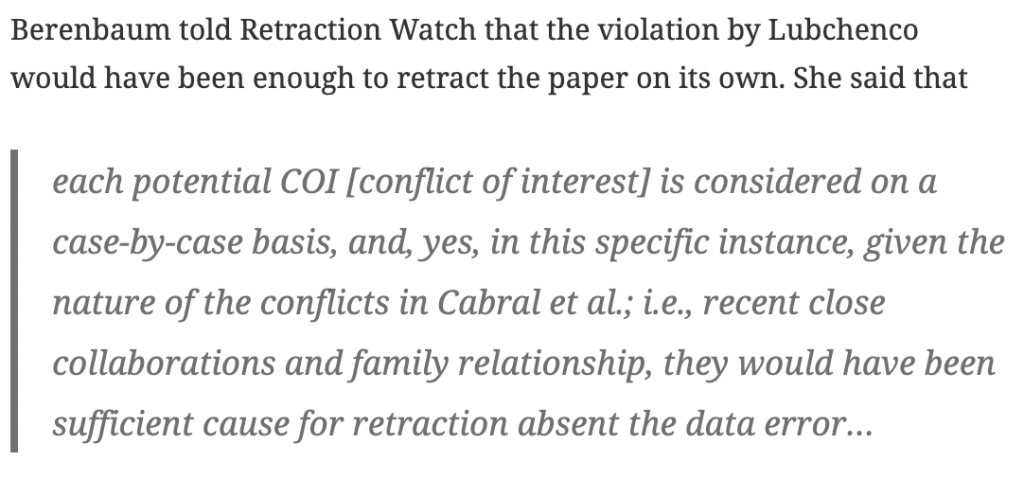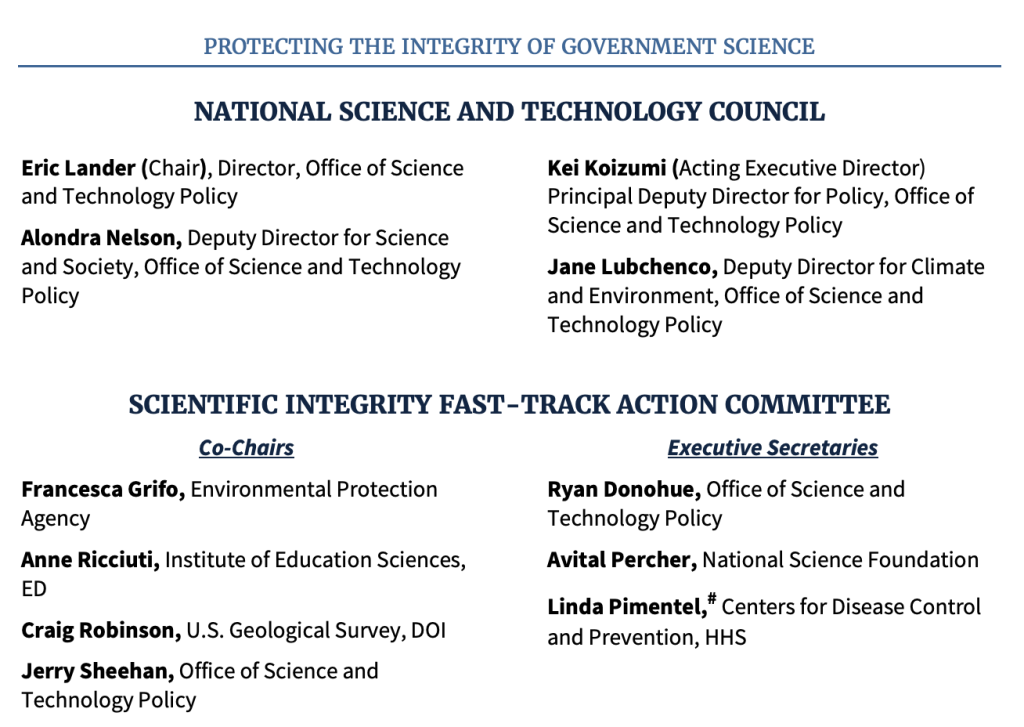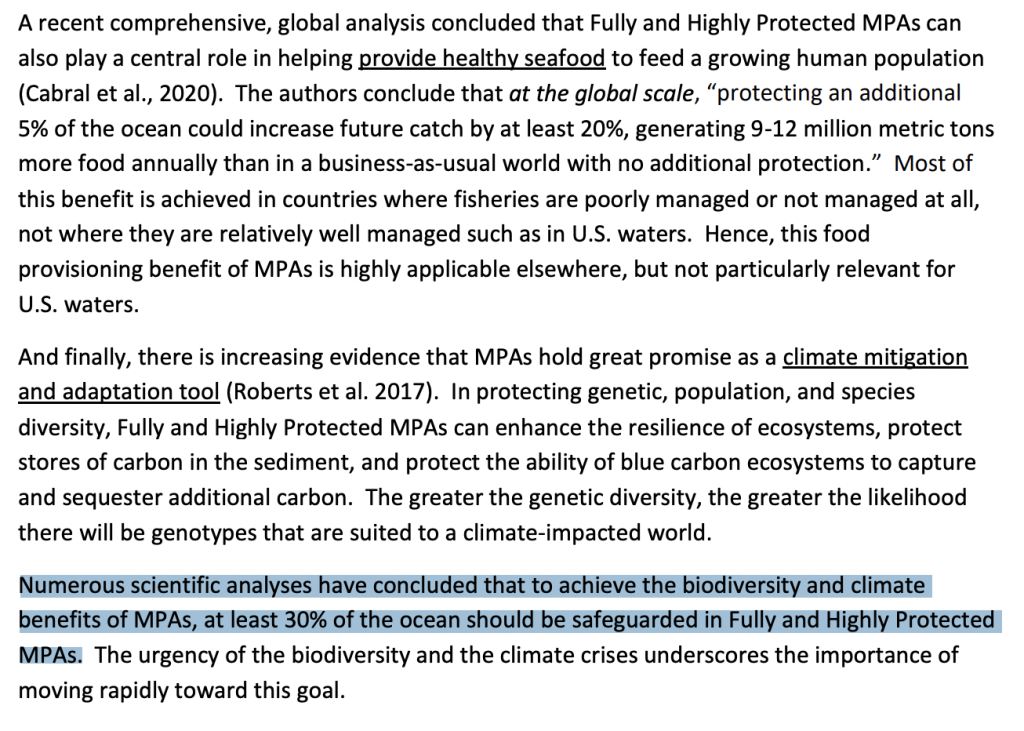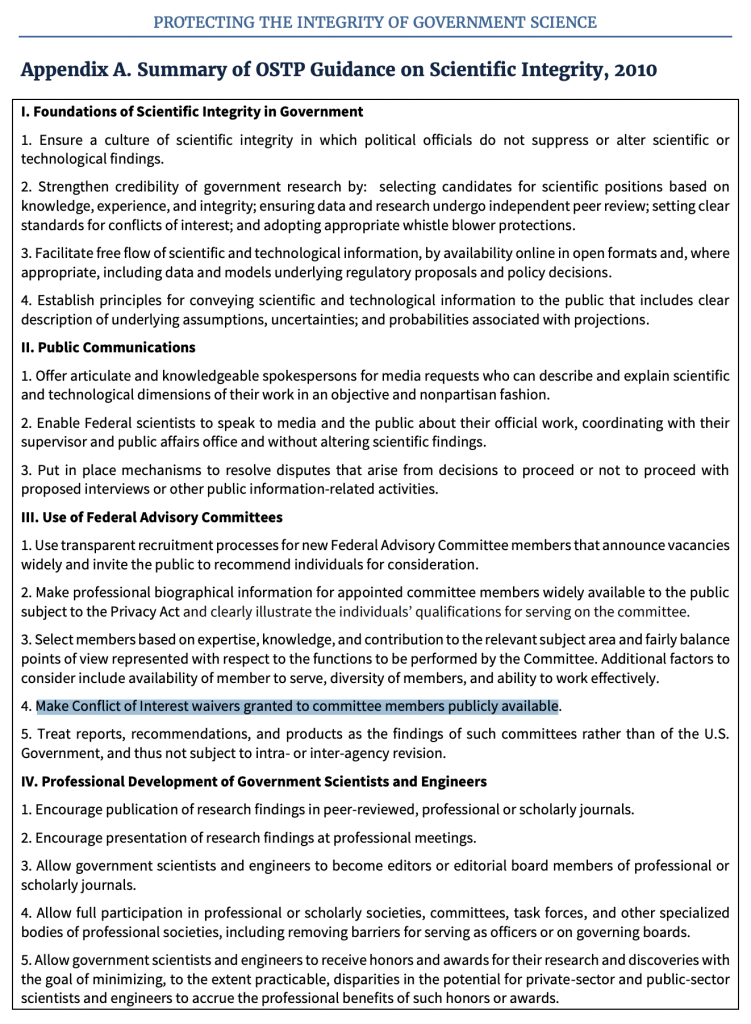Jane Lubchenco, a key climate aide for the White House Office of Science and Technology Policy (OSTP), has been barred from the National Academy of Sciences (NAS) publications for five years. Lubchenco is the deputy director for climate and environment. The severe reprimand from the prestigious organization states a violation of its code of conduct, specifically Section 3. The rebuke is related to a paper she edited before joining OSTP that was later retracted because its content was based on old data.
 NAS code of conduct/Section 3
NAS code of conduct/Section 3
 PNAS editors retraction statement
PNAS editors retraction statement
She was allegedly also closely aligned with the authors of the paper entitled "A global network of marine protected areas for food" by Reniel Cabral et al. Gaines is Lubchenco's brother-in-law. PNAS editor-in-chief May Berenbaum said Lubchenco's relationship with Gaines alone would have been a basis for retraction. Notably, Lubchenco published a related paper in the scientific journal Nature with the same authors that used some of the same outdated data. The Nature article is entitled, "Protecting the global ocean for biodiversity, food, and climate" (Sala et al.)
 Statement from PNAS Editor-in-Chief on Lubchenko
Statement from PNAS Editor-in-Chief on Lubchenko
The irony of the rebuke is that Lubchenco is responsible for spearheading scientific integrity policies for the Biden administration. The first report co-directed by Lubchenko was published in January 2022. The Scientific Integrity Fast-Track Action Committee report references a 2009 Obama administration memo identifying the six principles of scientific integrity as a basis for its investigation. Lubchenco worked for the Obama administration from 2009-2013 as Administrator of NOAA and Under Secretary of Commerce for Oceans and Atmosphere.
 Lubchenko/National Science and Technology Council
Lubchenko/National Science and Technology Council
The ranking members of the House Science Committee sent a February 10, 2022, letter calling out her use of outdated data and her conflict of interest. They highlighted that other prominent publications like National Geographic and the Washington Post cited conclusions from the article, "garner[ing] additional scrutiny from other researchers." The House Science Committee wrote that the "potential violation of scientific integrity is alarming given Dr. Lubchenco's position as Deputy Director for Climate and Environment."
They went on to write:
"It appears that Dr. Lubchenco has violated the very principals (sic) of peer review and conflicts of interest she has identified as crucial to Federal scientific integrity. The NSTC's report states, "Fostering an organizational culture of scientific integrity starts from the top, with effective leadership and modeling of appropriate behaviors." Based on this incident, we are concerned that Dr. Lubchenco cannot uphold the Administration's own policies, let alone be a model of appropriate behavior."
The Committee also referenced a November 17, 2020, hearing where she "testified before the House Committee on Natural Resources in support of H.R. 8632, the Ocean-Based Climate Solutions Act." She cited the very paper that was retracted. The members of the Committee questioned her judgment, raising "questions about whether the public can trust Dr. Lubchenco's objectivity in making decisions that could potentially impact their livelihoods." At the time, she stated that her support of H.R. 8632 was based on a belief that "30% of the ocean should be safeguarded in Fully and Highly Protected MPAs."
 Lubchenko Testimony/https://naturalresources.house.gov/imo/media/doc/Lubchenco%20Testimony%20UPDATED%20FC%20Leg%20Hrg%2011.17.20.pdf
Lubchenko Testimony/https://naturalresources.house.gov/imo/media/doc/Lubchenco%20Testimony%20UPDATED%20FC%20Leg%20Hrg%2011.17.20.pdf
Lubchenco also failed to disclose her relationship with the authors of the paper, a violation of the very guidance written in Appendix A of the Scientific Integrity Fast-Track Action Committee report. The Committee urged a review of her conduct, especially in light of her role in "developing a framework for the improvement of agency scientific integrity policies and practices."
 Appendix A./Scientific Integrity Fast-Track Action Committee report
Appendix A./Scientific Integrity Fast-Track Action Committee report
Lubchenco's conduct is not benign. In response to a "first-of-its-kind roundtable with some of the nation's leading scientists" in February, Lubchenco sounded the alarm on climate change and urged the acceleration of "effective action." As deputy director for an environmental agency, her input is potentially influential in disseminating consequential climate policies that are the underpinnings for American industry legislation and regulation. Such policies are costly and can potentially affect the everyday lives of average Americans. Therefore, it is essential that those policies are based on well-considered, solid scientific data and inquiry. An example of such legislation is the recent adoption of the Inflation Reduction Act. It is rife with consequential climate change policies. Lubchenco retweeted the Tweet pictured below.
It brings to mind the retraction of the Lancet study on Hydroxychloroquine (HCQ) based on unvetted data that was retracted during the pandemic in June 2020. It appears to have been a highly politicized study contending that HCQ was either ineffective or potentially deadly. The consequences of publishing the "fake" study were profound. WHO immediately halted global trials for HCQ, and millions of people worldwide were discouraged from using the cheap, life-saving drug to treat COVID-19. Dr. Zelenko estimated that close to 85% of those who died from COVID-19 died unnecessarily because they were denied effective and inexpensive early treatments.
Science.org reported that "NAS recently changed its bylaws to permit members to be temporarily suspended, rather than permanently ejected." Lubchenco is still an NAS member.
"The bylaw change to allow member suspensions was approved on June 24 in an online vote open to all 2500 NAS members, with more than 75% of participating members voting in favor. Requested by the standing Committee that reviews alleged violations of the academy's code, the change "will allow the NAS to take meaningful actions on conduct issues with less severe consequences," its president, Marcia McNutt, said in a statement to Science. A two-thirds vote of NAS's governing council will be required to restore a suspended membership.
Lubchenco said in a statement:
"I accept these sanctions for my error in judgment in editing a paper authored by some of my research collaborators — an error for which I have publicly stated my regret."


